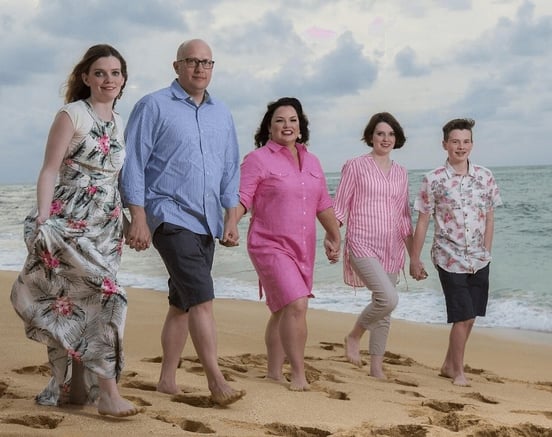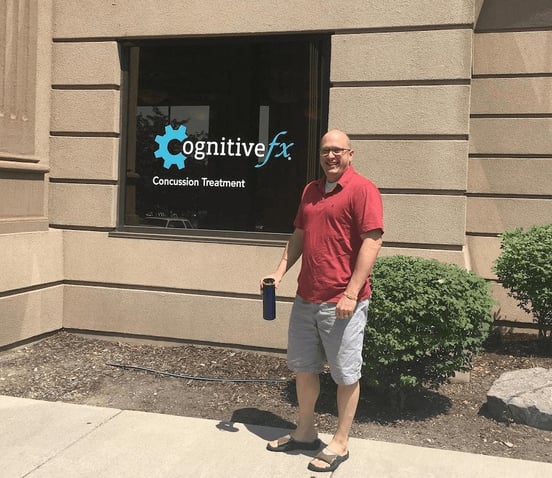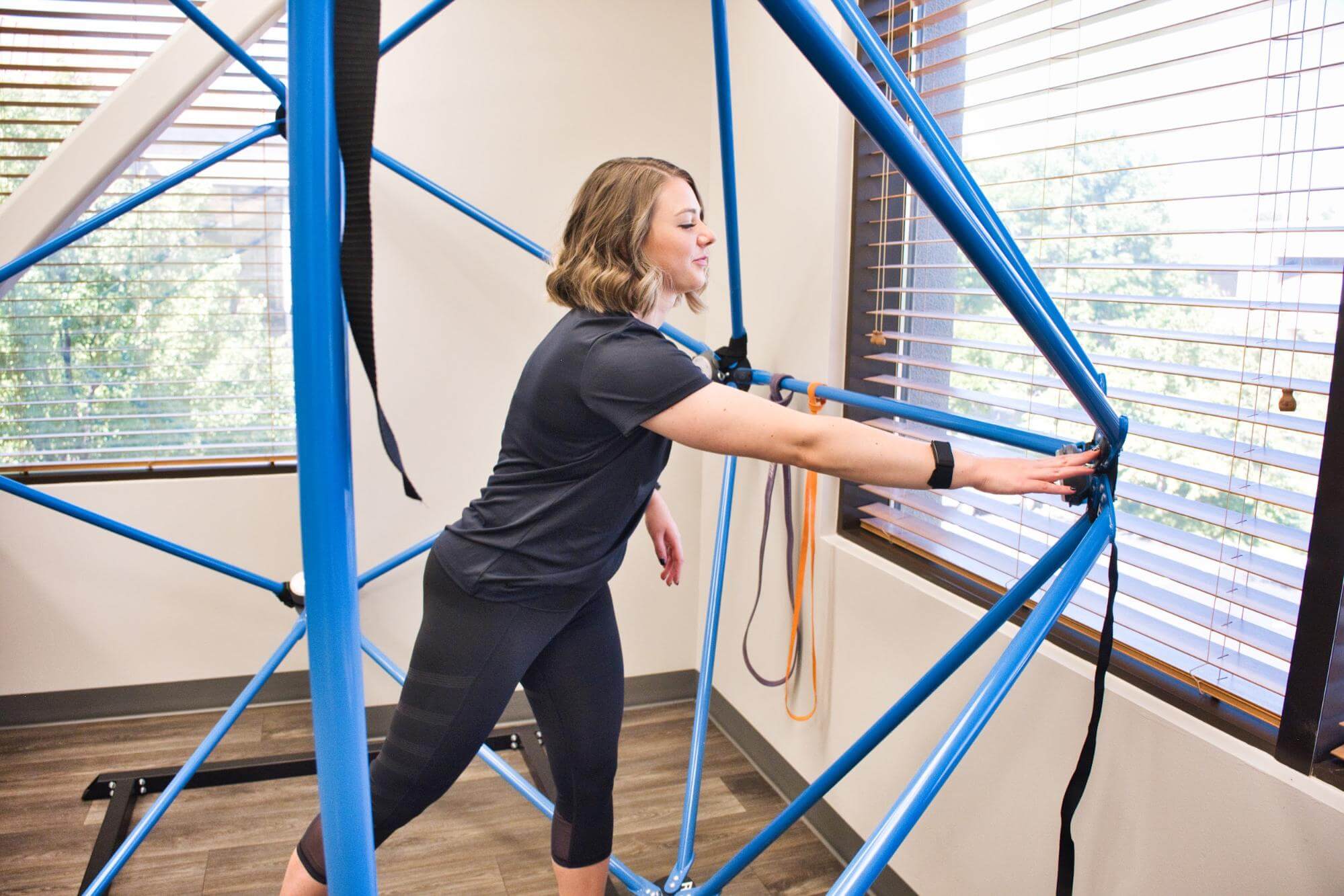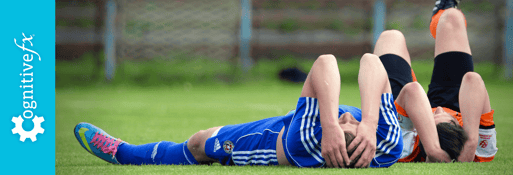If you’ve ever felt like you were suffering alone with a traumatic brain injury (TBI), you may find it reassuring to learn you’re definitely not alone.
Although every patient, brain injury, and recovery journey are unique, there are also some themes or lessons that recur over and over again in many patient stories.
For one thing, recovery isn’t an easy or linear process.
And of the nearly three million estimated TBIs in the US each year, up to 90,000 individuals are expected to experience lasting and disabling symptoms.
To make matters worse, patients are sometimes told (incorrectly) that there's no way to treat those persistent symptoms. Many people are told they can only recover up to a certain point, and that beyond that point, they won’t get better. Fortunately, the human brain has an amazing ability to keep improving with the right stimulation.
At Cognitive FX, we specialize in helping brain injury patients to recover. While the majority of our patients suffer persistent symptoms after mild traumatic brain injury (concussion), we’ve also helped many patients overcome lingering symptoms of severe TBI and other types of brain injury.
We know how inspirational and reassuring real-life accounts can be for fellow survivors as well as their caregivers, which is why we’ve collected these stories of people who survived serious brain injury to live full lives:
- Jamie, a professional skier who found meaning in her healing journey after a tragic mishap ended her athletic career.
- Aimee, who struggled with memory loss and constant headaches for seventeen years before she underwent successful treatment.
- Samuel, who as an adult experienced “mystery symptoms” that stemmed from a childhood brain injury.
- Ryan, a teenager who suffered a severe TBI in a car crash.
- Abigail, a brave young woman who defied both the odds and her neurosurgeon's expectations after surviving a 70-foot fall.
In some of these stories, years or even decades passed before these brain injury survivors underwent successful treatment for the long-term effects of TBI. Fortunately, with the right type of help, healing progress is possible, even if a long time has passed since the injury occurred.
At the end of this post, we’ll discuss key takeaways from patient recovery journeys and further resources for treatment.
If you’re suffering from persistent symptoms after brain trauma, don’t give up on recovery. Many of our patients struggle with headaches, word retrieval, feelings of overwhelm, and more before treatment. 95% of our patients experience statistically verified restoration of brain function after treatment at our clinic. To learn if you’re eligible for our program, sign up for a consultation with our team.
Note: Any data relating to brain function mentioned in this post is from our first generation fNCI scans. Gen 1 scans compared activation in various regions of the brain with a control database of healthy brains. Our clinic is now rolling out second-generation fNCI which looks both at the activation of individual brain regions and at the connections between brain regions. Results are interpreted and reported differently for Gen 2 than for Gen 1; reports will not look the same if you come into the clinic for treatment.
Jamie's Story: A Professional Skier Who "Had to Relearn Everything" After a Severe Brain Injury
As a teenager, professional athlete Jamie "MoCrazy" Crane-Mauzy was already one of the world's best slopestyle and halfpipe skiers. She was the first woman in the world to land a double backflip at the X-Games, and by the age of eighteen, she'd won the Junior World Championships and moved to Utah to continue her training.
But during a competition in British Columbia in 2015, Jamie endured a shocking accident. She under-rotated during a double flip, causing her skis to become stuck in the snow and whipping her head downward, where it impacted the ground. She was airlifted to the hospital and placed in a medically induced coma for eight days.
As a result of the massive traumatic brain injury, when she woke up, Jamie was unable to use her right hand or move the right side of her body. With the help of her family members, she began the arduous process of relearning how to perform simple tasks such as drinking water, picking up small objects, and climbing the stairs.
Although she was able to achieve significant progress in her inpatient and outpatient rehabilitation, Jamie says she still found herself “on the verge” of clinical depression, and her cognitive function was measurably deficient.
In 2019, Jamie came to Cognitive FX to seek further progress in her healing journey. As an athlete, she says, she really appreciated the “challenge” and the goal-oriented nature of treatment — elements that she felt were often missing from her life since she was no longer training and competing as a professional skier.
She worked hard; the combination of physical and cognitive exercises, “all the multi-tasking,” and all the various forms of treatment each day at Cognitive FX increased her sleep requirements.
Jamie would take a two-hour nap before dinner, eat her meal, and then sleep for around ten hours instead of her usual eight hours per night. She correctly notes that rest and recuperation are essential considerations for getting the most out of TBI treatment.
At the end of her treatment week at Cognitive FX, Jamie was "a little bit nervous" about finding out her results. While she could already sense improvement, there was some underlying anxiousness about measuring changes in her brain function at the end of the treatment period.
But when she received the results of her fNCI scan (a type of functional MRI that measures blood flow in the brain as the patient executes a battery of cognitive tasks), she wept with relief and joy at finding out just how dramatic the improvements in her brain function really were.
She's since noticed benefits in her day-to-day life, too, including having an easier time making and following through with plans, finding the right words to communicate what she’s thinking or feeling, keeping up with conversations that go on around her, and "seeing the big picture." Her family and loved ones have also noticed and commented on the positive difference.
Jamie’s message for other severe TBI survivors is this: “Don’t just settle — heal!”
Want to know if you’re eligible to receive the treatment Jamie went through? Schedule a consultation with the Cognitive FX team.
Aimee's Story: Learning How to Heal 17 Years After a TBI from a Car Accident
Aimee experienced a severe traumatic brain injury due to a car accident in 2001. She struggled with difficult TBI symptoms for nearly seventeen years before receiving treatment.
The most notable symptoms were personality changes, constant headaches (but "I only allowed myself to talk about them when they were above a 7 or 8 on a scale of 1-10," Aimee recounts), inability to remember “pretty much anything” (she relied on her phone all the time to keep lists and set reminder alarms), exercise intolerance, dizziness, and light and sound sensitivity.
She also received a diagnosis of narcolepsy due to constant exhaustion and fatigue symptoms.
When Aimee first learned about Cognitive FX, she admitted she was “unbelieving,” but she decided to schedule a consultation anyway. She also spent a week talking to people, learning more about treatment for old head injury symptoms, and weighing the pros and cons.
Ultimately, Aimee said, "It's my brain. If this can help, I'm going to try it," so she decided to move forward with treatment.
If she had any residual doubts before starting her week-long intensive treatment session, they were soon replaced by a sense of hopefulness and excitement.
The treatment methods that stood out the most for her were occupational therapy, neuromuscular therapy, and Dynavision (a multi-tasking coordination and cognition exercise). Aimee was also impressed with the facility and highly appreciative of the Cognitive FX staff.
At the end of the week, Aimee recalls feeling enthusiastic and optimistic about her results. She was "so excited she couldn't even contain herself," and she felt a strong urge to talk. Notably, she was "using a lot of words she hadn't used in a long time ... remembering things and not relying on [her] phone so much," and feeling "more like [herself] from ages ago, but a better version."
Following the initial treatment period, Aimee spent a few days readjusting and settling back into her life at home. To stay on top of her recovery process, she followed through with the prescribed "brain game" homework, as well as with vision therapy for her eyes (with an ophthalmologist to whom the clinic referred her).
Looking back and comparing her life before treatment versus after, Aimee observes she's gotten more effective at multitasking, her memory is better, and her vocabulary is noticeably more sophisticated — her master's degrees are "paying off nowadays," she jokes.
She’s also less likely to become overwhelmed, isn’t confused as often, and rarely finds herself stumbling over her words. The headaches still occur sometimes, but they’re less frequent and less severe.
Aimee would recommend Cognitive FX “hands down, to anyone, in a heartbeat.” In one week, you go from “not having any hope,” she says, to “getting your life back.”
Samuel's Story: A "Life-Changing" Recovery 33 Years After Childhood Brain Injury
A businessman and father of three in his early 40s, Samuel Gray had long experienced mysterious symptoms including "brain fog," sensitivity to sounds, short-term memory loss, and depression.
He would feel exhausted every day after work, then would usually withdraw into the bedroom for the evening because he didn’t have any energy remaining to participate in family life.
 Sam with his wife and three children
Sam with his wife and three children
Eventually, Sam would trace his lingering symptoms back to a rare and severe form of brain trauma he had survived as an eleven-year-old.
One day while playing in the yard as a child, he had developed an intense, pounding headache, which was soon followed by vomiting. When he ran to the kitchen, his mother thought he had the flu, but his condition didn't improve after several days.
When his family took him in for medical care later that week, the doctors pronounced him lucky to be alive and not "dead or comatose."
It turned out that Sam had survived a "brain bleed," or intracranial hemorrhage, a dangerous event that flooded his brain with blood and resulted in problems with neurovascular coupling, similar to the issues caused by a serious concussion.
Because Sam had survived the event without surgery, he received a favorable prognosis and counted himself as incredibly fortunate. He mostly forgot about the "brain bleed" and went on to graduate high school, earn an MBA, and proceed to a successful career in finance.
However, Sam did develop migraine headaches and other symptoms in the years after the hemorrhage. His doctors attributed these problems to either PTSD from his "brain bleed" experience or some type of mysterious, un-diagnosable hereditary issue — but no one made any direct connection to the hemorrhage event itself, nor did anyone realize that lasting functional impairment from his brain trauma could be responsible for these later symptoms.
Unfortunately, the undiagnosed symptoms didn’t improve with time. In fact, they got worse, and Sam also began to struggle with debilitating depression and anxiety symptoms.
Around this same time, Sam's nephew had a skiing accident followed by persistent post-concussion symptoms that were remarkably similar to Sam’s.
Following his nephew’s successful treatment at Cognitive FX, Sam’s sister was the first person to make the connection between Sam’s childhood brain trauma and his ongoing symptoms. She immediately urged him to sign up for a consultation to learn if the childhood “brain bleed” might be behind his mystery symptoms as an adult.
While he was initially skeptical, Sam eventually decided he had nothing to lose. As he filled out the application form, he was surprised to realize that he had many of the symptoms associated with brain trauma.
When he showed up for pre-treatment screening at Cognitive FX and received an fNCI, it turned out that many regions of Sam's brain were severely functionally impaired. In other words, he was definitely a candidate for treatment.
The week Sam spent at Cognitive FX was an especially grueling experience — after all, he was relearning how to use areas of his brain that had been dormant for 33 years!
 Sam at Cognitive FX, where he received treatment for his lingering TBI symptoms
Sam at Cognitive FX, where he received treatment for his lingering TBI symptoms
Today, Sam will tell you that he feels like he "woke up from a dream" following treatment. Everyone notices a change in him, but especially his wife, who previously had to help him constantly with finishing his sentences and keeping up with his daily schedule.
In his own words, he feels “unstoppable” now, and maintains that treatment for brain trauma changes your life.
If Sam’s story resonates with you and you’d like to learn more, you can read the full version here.
Note: If you’re experiencing symptoms that won’t resolve after a traumatic brain injury, you’re not alone. And you’re definitely not imagining things. On average, our patients improve by 75% after treatment at our center specializing in post-concussion therapy. To learn whether you are eligible for treatment, schedule a consultation.
Ryan's Story: Recovering from Severe TBI Symptoms Following an Auto Accident
Ryan was living the life of an ordinary teenager until he had a serious car accident that resulted in a severe traumatic brain injury.
While unfortunate, this is not uncommon. Car accidents are a leading cause of TBI, and it’s one reason why adolescents and young adults have some of the highest brain injury rates of any age group.
Following the accident, Ryan struggled with short-term memory problems, long-term memory problems, focus problems, sleeping problems, clarity problems, headaches, and fatigue.
And as if those symptoms weren’t enough to deal with, he later developed severe anxiety issues as a delayed consequence of the TBI.
Although he was very motivated to heal and had “tried many forms of therapy,” nothing seemed to provide significant relief or progress.
Luckily, Ryan’s aunt found out about Cognitive FX and encouraged Ryan and his parents to look into the effectiveness of state-of-the-art brain injury treatment methods.
With support from his family, Ryan decided to attend treatment at Cognitive FX because he and his parents recognized the need for him to “[re]develop the processes” required for normal brain function.
Remarkably, Ryan’s energy levels and sleep quality began to improve following the very first day of his intensive one-week treatment period. The trend continued, and he felt better and better as treatment proceeded.
He also noticed rapid improvements in focus, multi-tasking, and short- and long-term memory.
The things that stood out the most to Ryan about the Cognitive FX team were their exceptional level of caring, their tendency to check in regularly to ask about his well-being, and the frequent progress measurements that are part of every treatment plan.
According to him, the genuine compassion creates a comforting and reassuring environment that’s almost like family, which makes a huge difference in recovering from a head injury.
His mother echoes these thoughts, describing staff as "kind, professional, and capable."
And although the week-long treatment stay was the catalyst for Ryan’s dramatic recovery, healing didn’t stop there.
Like other Cognitive FX patients, he received an individualized six-month at-home treatment plan prescribing him brain exercises, physical therapy, nutrition, and other recommendations for brain health — something his mother says she appreciated both from the perspective of a parent and as someone who works in the medical field.
Today, Ryan is excited, happy, and ready to move on with his life. If you ask him, there's no question that Cognitive FX has helped: "It definitely changed my life for the better," he says.
If you’d like to hear accounts from other people who experienced memory loss after a brain injury, you can browse this collection of stories.
Abigail's Story: Severe TBI and Three-Month Coma, She Blew Away Doctors' Expectations
 Wildflowers growing next to Lisa Falls, near Abigail’s “secret spot”
Wildflowers growing next to Lisa Falls, near Abigail’s “secret spot”
Abigail Ward is a young woman who loves to hike in the mountains near her home in Utah. One of her favorite hiking spots used to be Lisa Falls, a beautiful waterfall in Little Cottonwood Canyon that boasts a dramatic 70-foot cascade.
Most people make the short and easy hike to the bottom of the falls to watch the water falling down from above, but Abigail isn’t like most people. She preferred the challenge of hiking up to the top of the waterfall, an area she thought of as her “secret spot.”
One day, in the middle of summer in 2016, eighteen-year-old Abigail and her fifteen-year-old brother decided to go for a fun hike at the falls before she left for a mission trip.
Although she’d made the steep climb many times, all it took was one misstep on the slick surface, and Abigail fell seventy feet. She landed in a shallow pool of water, brain-injured and rendered unconscious from the impact.
Luckily, Abigail’s brother thought fast and managed to scramble down, carefully lift and hold her head out of the water, call 911, and provide emergency responders with the correct location coordinates. She remained unconscious as rescuers arrived and hoisted her out of the canyon with a Life Flight helicopter.

Abigail after her fall
She was in critical condition upon admission to the hospital’s ICU (intensive care unit), then was later upgraded to “serious” condition. Nonetheless, emergency physicians made the call to put Abigail into a medically induced coma for her safety.
Doctors weren’t sure Abigail would survive, and her coma lasted for three months. As she emerged from the coma and began the arduous healing process, Abigail worked hard and slowly began to regain her motor skills, memory, and ability to talk. She attended daily physical and occupational therapy for a full year, followed by thrice weekly therapy for another whole year.
After her two years of rehabilitation services and speech therapy, she'd made so much progress that she was able to return to college — which is a remarkable accomplishment for someone who had been told she'd probably spend the remainder of her life stuck in bed.
Despite all her healing progress, though, Abigail still wasn’t convinced she’d reached the pinnacle of her recovery. During her quest for continued healing, Abigail found Cognitive FX through an acquaintance who spoke highly of their treatment outcomes at the clinic.
Her parents were supportive and encouraged her to attend the clinic for an fNCI scan to screen for ongoing brain dysfunction. The scan revealed several hypoactive brain areas, including her posterior temporal lobe (an area of the brain used in processing auditory information and encoding memories).
Based on the scan and other tests, as well as Abigail's self-reported symptoms, the Cognitive FX treatment team then custom-tailored a therapy plan for her.
According to Abigail, the intensive treatment week was much more multidisciplinary than any other therapy she'd received in the past — including neuromuscular, cognitive, occupational, vision therapy, and more.
She found the week challenging and engaging, but also enjoyed the restful pauses and meditation sessions that gave her the peace and quiet she needed to relax, heal, and gather herself for more treatment exercises.
The week-long treatment helped Abigail achieve measurably better brain function, and she also noticed a dramatic improvement in sleep quantity and quality. For the first time before her accident, she could finally sleep more than six hours each night.
But as is the case with many survivors of serious accidents, there were still some areas for further improvement. Based on her assessments at CFX, Abigail learned she needed to put continuing effort into her vision and her mental health. She’s been working on both and is happy with her continued progress.
 Abigail Ward today, “95% recovered”
Abigail Ward today, “95% recovered”
If you ask Abigail and her family how she's doing today, they'll tell you she's 95% recovered and feeling very optimistic about her future. She continues to work on staying healthy by using brain games, vision exercises, and physical activity.
You can learn more details of Abigail’s amazing and inspirational story here.
The Biggest Lessons from TBI Stories

While every recovery story is different, some common themes emerge that can be extremely helpful for brain injury survivors to understand.
First of all, at least four of the five patients from this article had very strong support groups that encouraged them to persevere and keep going no matter how difficult things got.
Having friends and family members who truly care undoubtedly helps TBI patients stay strong. And for some survivors, such as Ryan, Samuel, and Abigail, their support networks actually led them to finding effective treatment at Cognitive FX.
Second, there are often two (and sometimes more) phases to recovery from moderate or severe brain injuries. The initial phase, which typically includes hospitalization, initial rehabilitation, and regaining of basic function, may last several months or longer.
But just because a survivor makes it through the first phase of recovery and is able to lead a life that appears normal on the surface doesn’t mean they’re fully healed or that everything’s fine now.
And in cases where actual brain damage occurs (the loss or permanent damage of brain tissue, which includes surgical removal of brain tissue), recovery may be more limited. That said, no one can say for certain how much function a TBI survivor will regain, and more often than not, well-meaning providers underestimate patients’ recovery capabilities.
It’s not uncommon for people with any brain injury (including mild concussions, but especially moderate or severe TBIs) to experience persistent symptoms that last for years or even decades. Instead of getting better on their own, such problems tend to stay the same, get worse, or change in unpredictable ways.
Lingering symptoms may be common, but many healthcare providers remain unaware of them. As a result, too many TBI survivors suffer in limbo, or even come to believe they’re imagining things.
If you’re a TBI survivor with lasting symptoms, a mindset that combines hope, positivity, and acceptance can serve you well as you take steps toward recovery from severe TBI.
For more details on how treatment can work for you, please refer to our pages on the brain injury treatment process and patient treatment outcomes.
Further Resources for Recovery
 A therapist demonstrates an exercise for sensorimotor therapy at Cognitive FX.
A therapist demonstrates an exercise for sensorimotor therapy at Cognitive FX.
Here is some additional reading to help you on the road to recovery.
Causes of Long-Term TBI Symptoms
Brain damage is just one cause of persistent symptoms. Patients often also need help with the following to complete their recovery:
Foods & Medications That Impact Your Recovery
What you eat, the supplements you take, and the medications you’re on can all impact the speed and quality of your recovery.
Learn more here:
Mental Health Matters, Too
Brain injury survivors frequently develop emotional symptoms that persist for months or years after the injury. Here are a collection of educational articles dealing with the most common persistent brain injury symptoms affecting mental health:
What will the next chapter in your recovery story be like? If you’re experiencing lasting symptoms following a traumatic brain injury, you may be eligible for treatment at Cognitive FX. To learn more, schedule a consultation.
















